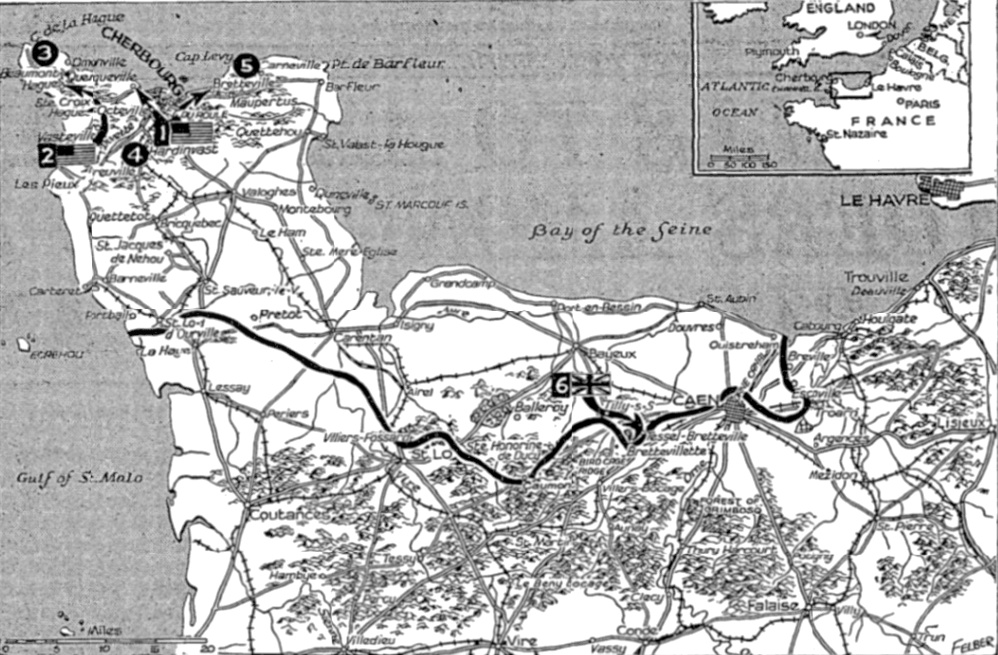French patriots gain new status
Forces of Interior put under Kœnig, acting by authority of Gen. Eisenhower
SHAEF, England – (June 25)
The French Forces of the Interior received today a status in the Allied operations comparable to that of the invasion forces.
Supreme Headquarters, which had already been moved to compliment the resistance forces on the positive contribution that their disruptive activities against the Germans had made to the battle of the beachhead, accepted them into partnership in the campaign for the liberation of their country. It announced tonight that Brig. Gen. Joseph-Pierre Kœnig, commander of the French forces in Britain, chief of the French military mission at headquarters and military delegate for liberated French territory, had been appointed commander of the French Forces of the Interior. The announcement said:
Gen. Kœnig is acting under and by the authority of the Supreme Commander [Gen. Dwight D. Eisenhower] in directing the operations of the resistance forces in France.
The first message that the hero of Bir Hakeim had to deliver to his new command was one of the “warmest commendation” from Gen. Eisenhower. Gen. Kœnig predicted that the underground would play an “ever-increasing” part in the liberation campaign.
The elevation of the status of the underground was regarded as one of the first fruits of Gen. Eisenhower’s announced military agreement with Gen. Kœnig and the basis for another piece of practical cooperation that might lead to a more friendly understanding among the French, British and Americans. One outcome of the broader recognition of the French underground will probably be an effort to arm its forces more adequately.
Tolerance urged in France
Berne, Switzerland – (June 25)
Some leaders of the resistance movement in France are preaching tolerance under the watchword, “France first,” and their action implies a rebuke for all who advocate a general “purge” as a prerequisite to reconstruction.
The plea is made by the National Council of Resistance, which supports Gen. Charles de Gaulle and the French Committee of National Liberation. Its purpose is to rally the masses whose sole link hitherto has been detestation of the Germans and whose resistance has been merely passive.
The council disapproves of the publication of lists of “collaborationists” in which no distinction is made between those who deliberately mislead and those who have been misled. The council says:
The latter should not be driven into the arms of the occupant but, on the contrary should be welcomed by the resistance movement after due repentance.
Since the armistice, the population has become weary of “purges” ordered by every new Minister. Moreover, many minor government servants, from road menders to stenographers, resent being called “collaborationists” because they kept their jobs in order to live.
French protest U.S. news article
Analysis of differences with U.S. criticized; Roosevelt hits by Algiers paper
By Harold Callender
Algiers, Algeria – (June 25)
The French Committee of National Liberation has protested to the American diplomatic mission here against The Stars and Stripes’ publication of an article from the United States News saying that the differences between President Roosevelt and Gen. Charles de Gaulle had been caused by the President’s reluctance to sanction the return of French overseas possessions without guarantees for American security.
But a weekly here, that professes simon-pure de Gaullism, has published a long attack on Mr. Roosevelt on the assumption that he seeks “to acquire strategic bases at the expense of the French Empire.”
What impresses Frenchmen who are not extremists is the fact that the United States News article was published on French soil by an official American newspaper just when anti-American sentiment here has been stimulated by Gen. de Gaulle’s denunciation of American policy in France and the consequent severe comments in the American press. Frenchmen point out that The Stars and Stripes is widely read by Frenchmen here who cannot make fine distinctions between the source of an article and the instrument of its distribution.
Frenchmen concerned for future relations with the United States are disturbed by the whispering campaign to the effect that U.S. troops are unpopular in North Africa and will be even more unpopular in France. They wonder what the motive for this can be unless it is to alienate France from the West in the interest of what is called a continental policy based on the alliance with Russia that Gen. de Gaulle has advocated.
Even those who are friendly to the United States say, “You must not treat us like a conquered country.” Thus, they imply that there is a danger of such treatment. This is the popular version of the long-existing official fear of the Allied Military Government in France.
This fear and Gen. de Gaulle’s recent criticism of the Allied policy in liberated France have encouraged the tendency to look with frank distrust on the liberators of France, above all the Americans, to whom imperialistic aims of various kinds are widely attributed in private conversation and sometimes in print. One French observer said:
This is pure folly, for we shall rely on the United States for machinery for French factories, most of which have been destroyed or robbed of their equipment by the Germans, and in our weakened condition we shall have to count on America for protection for our empire.
